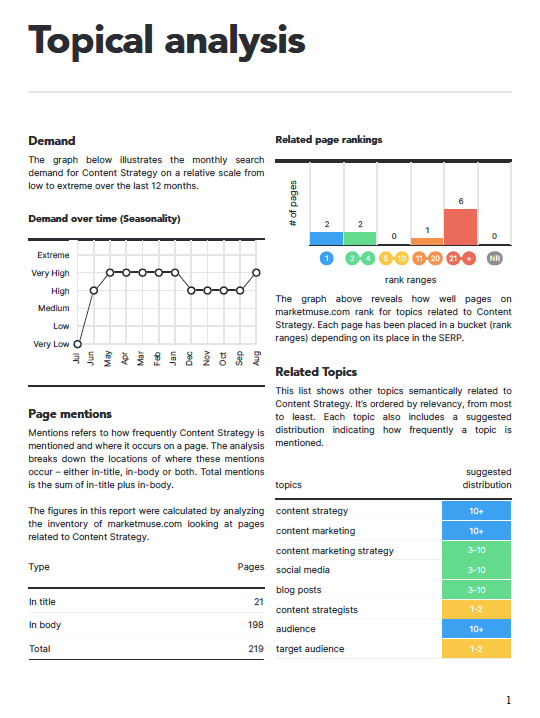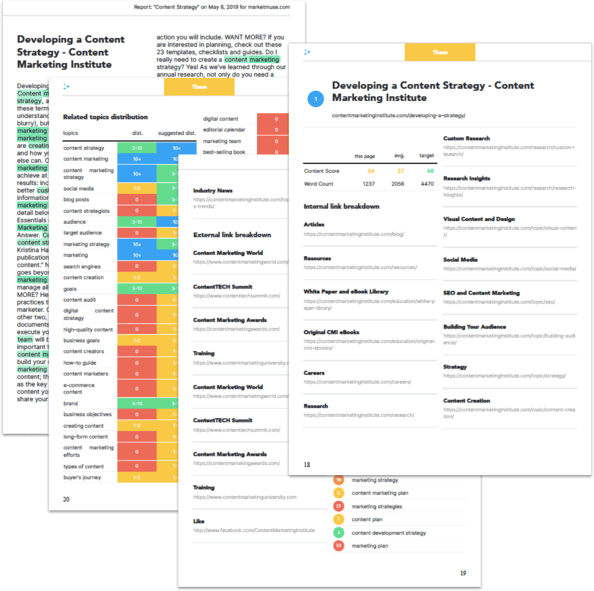How MarketMuse Topic Report Leaves Rank Tracking in the Dust
Are you the type that obsesses about your position in the SERP? Are you checking your favorite keyword ranking tool daily, just to get a peek at those numbers?
Does seeing your site at the top spot for your favorite keyword makes you feel all warm and tingle inside? And what about those search terms that don’t even make second page? The feeling’s not as good, I’m sure.
But what does the data actually tell you? It may tempt you to think that search engines are just a fickle beast.
Truth is, a rank tracker can give you a number, but that’s about it. What can you really analyze? There’s no context or additional insight to be had. Forget about getting any data at the site level; that’s way too much work.
In this post, I’m going to show you how to get that additional context through the MarketMuse Topic Report. This report offers a snapshot of where you stand with your topic. You won’t find more competitive insight anywhere else! And you can print them out to act as a playbook.
Think of the MarketMuse Topic Report as a launchpad for creating a plan for what content to create and optimize around a given topic. It’s like a bridge between your strategy, plans, and MarketMuse Content Briefs.
The report is an accumulation of critical intelligence from MarketMuse Suite, all in one place. It provides an expertise score for your content, heat map insight (including must-have topics, differentiation opportunities, plus important topics) and SERP features and their contents.

The MarketMuse Topic Report lets you closely inspect competitive pages and content on your domain, without doing any of the heavy analytics lifting. Specifically, the Topic Report reveals:
- The current and target word count, content score and page ranking for the top 20 results in the SERP.
- Differentiation opportunities based on gaps in competitive content.
- Related topic distribution for each page and heatmap showing clear opportunities for optimization.
- Internal and external link breakdown, helping you understand what search engines find valuable.
- Full text from your content, highlighting suggested topic alternatives to help you avoid keyword stuffing and create language variety.
Better yet, get a MarketMuse Topic Report on a monthly basis and receive insights on:
- How the changes you made impacted performance and ranking.
- Changes to the SERP.
- How to pivot based on competitive activity and movements.
- What to create or optimize to advance your content plan.
Rank tracking software has severe limitations when it comes to providing the information you need to succeed in this digital marketing environment. Wasted time and missed opportunities is the result of evaluating content performance and without the right data.
To truly compete for your topic in search, marketers must:
- Evaluate the competitive landscape.
- Measure content performance at the topic, page and site level consistently.
- Understand weaknesses and gaps in coverage.
- Provide their team with insights and analyses essential for creating a comprehensive plan for gaining authority on their topic.
That’s something you’re just not going to get from a rank tracker.
So, do you just want to sit around all day and watch search engine rankings mysteriously fluctuate? Or do you want to own your topic, basking in the glory of all that additional organic traffic?
Get the unfair advantage. Click here for your own MarketMuse Topic Report.
Let’s take a look at an example of a MarketMuse Topic Report for the topic “content strategy.” The report is divided into 13 sections and 150+ pages, so we’ll take a broad overview of the insight contained within.
Topical Analysis
The first section of the report provides a high-level view of the topic and the coverage it receives on your site. Look at this first to get an understanding of how well your site covers the topic. There are four subsections in this part of the report:
- Demand (showing monthly search demand for the topic over time)
- Page mentions (how frequently the topic is mentioned on your site and where – in the title or in the body)
- The number of pages ranking for related topics and their position in the SERP
- A list of topics semantically related to the focus topic of the report

SERP Features
It’s been a long time since search results consisted of merely ten blue links. In addition to ads, there are related questions, featured snippets, image pack, news box, reviews and knowledge panel. The appearance of these SERP features can help one better understand Google’s favoured intent for this topic.

Content Scores
MarketMuse Content Score provides insight into how well a page covers a particular topic. It’s a unique value assigned to a page based on its coverage of that topic. Since 100% coverage of a topic is impossible, there is no perfect score. Instead, content score must be evaluated against the competition. The Content Scores section of the Topic Report reveals content scores for the top 20 ranking pages for the report’s topic.

Word Count
Forget any rule of thumb when it comes to content length. This section of the report gives clear indication exactly how long a blog post should be, in order to adequately a topic. MarketMuse uses an advanced extraction method that analyzes a web page and separates the article from the rest of the text on a page.
Determining the extracted word count for pages in the Top 20 reveals the length a piece on this topic should be to cover it comprehensively. Used in conjunction with content score, it helps in finding your way to creating expert content; explaining a topic clearly and concisely.

Expert Pages
Creating comprehensive content with a high content score is very important, but you should strive to be succinct. By looking at the word count of the top ranking pieces of content and comparing their length to their topic density and Content Score, MarketMuse determines which pieces are written with the most precision. Expertise Scores show us a target where we have hit a “goldilocks” zone, delivering the most valuable information with the most precision possible.

Top 20 Ranking Pages
This section provides a list of the top 20 ranking pages in the SERP, along with their word count and content score. Again, this helps to further understand how in-depth and comprehensively the competition is treating the topic.

Competitive Heatmap
The competitive heat map is a color coded grid that reveals important information concerning content gaps and differentiation opportunities. Some of those opportunities are readily apparent; the red squares indicate no mention of the related topic on that page in the SERP. However, the next section in the report gives even more detailed insight.

Heatmap Insights
The insights in this sections are derived fro the data provided in the heatmap in the previous section. Specifically, it covers must-have topics, gap and differentiation opportunities, and important topics that are relevant and consistently used in high-ranking pages.

Page Breakdowns
Every page that ranks in the top 20 gets its own detailed page break down. Here you’ll discover how the competition uses the related topics, other keywords their page ranks for, and breakdowns for internal and external links (indispensable for understanding their linking strategy).

Your Content
The second half of the report deals with content on your site. For pages related to the topic of the report you’ll see content scores and word counts, plus a listing of your best pages along with their rank, word count and content score. Review these pages to evaluate how comprehensive and in-depth the topic is covered on your website, and prioritize improvement opportunities.
The internal heatmap section should be examined to determine what pages are candidates for improvement and how they can be made better.
The last section deals with page breakdowns of any pages of content related to the topic of the report. This granular analysis enables a content strategist to determine what changes to implement to improve coverage and gain topical authority.
While rank tracking software may make you feel good (or bad), only a MarketMuse Topic Report can tell you how to improve your content.
Get the unfair advantage. Click here for your own MarketMuse Topic Report.
Stephen leads the content strategy blog for MarketMuse, an AI-powered Content Intelligence and Strategy Platform. You can connect with him on social or his personal blog.